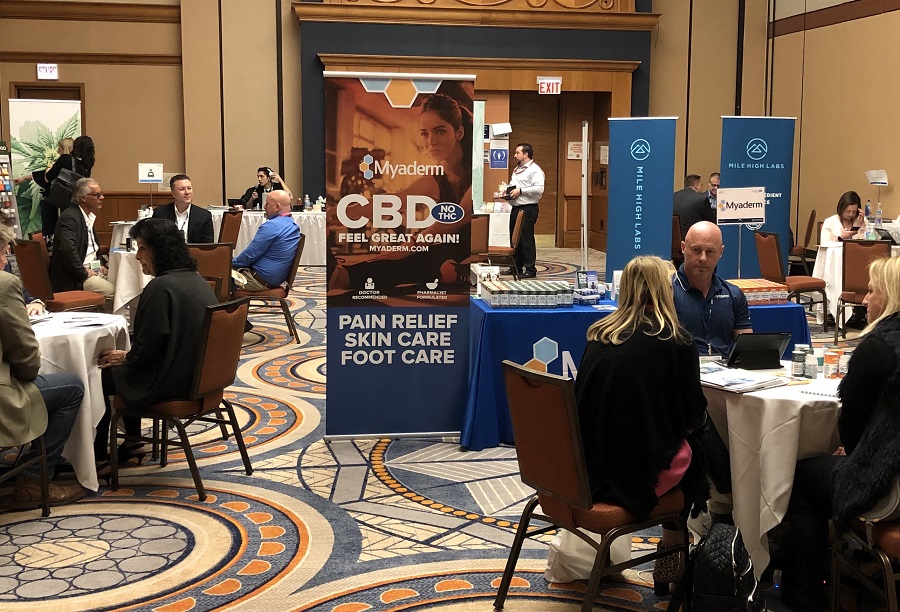CBD and Mass Retail: A Perspective from the Trenches 5/6/2019

There is no doubt that CBD is top-of-mind with retailers these days. Indeed, an analysis of retailer activity on ECRM’s RangeMe product discovery platform shows that CBD is by far the most commonly searched term by retail buyers and category managers, particularly among the categories of vitamins and supplements, topicals, beverages and pet. And with CVS and Walgreens now officially entering the game we can expect more retailers to get onboard with it, and quickly.
At ECRM’s Hemp/CBD Health & Beauty Care EPPS held this past February in Chicago, and again at our Weight Management, Sports Nutrition, Vitamin and Hemp Solutions sessions, I had the opportunity to sit in on meetings between retailers and CBD suppliers and get an “in the trenches” view of what’s top-of-mind for buyers and category managers. It was it was clear from observing these discussions that buyers are acting with extreme meticulousness in their search for the right suppliers, both for legal and regulatory reasons, but also in the interest in finding the best supplier-partners in a segment that sees new entrants on an almost daily basis.
As we learned during Chain Drug Review’s panel discussion held during these sessions, most mass retailers are taking a fast-follower approach, or else dipping their foot in the water with a limited number of SKUs, most likely avoiding anything ingestible until the FDA issues its opinion. CVS, for example, it starting with topicals only. “We’re going to walk slowly, but we think this is something that customers will be looking for as part of the health offering,” CVS CEO Larry Merlo said in an interview with CNBC’s Jim Kramer.
Once the FDA does issue an opinion – and most in the industry predict it will be a favorable one – those buyers and category managers I spoke with plan to pounce. The consensus is to start with an overall wellness section that spans multiple CBD categories such as supplements, beverages, oils and topicals, then possibly move the products into their respective categories once CBD becomes more mainstream.
“At the beginning of the day I was really thinking more along the vitamins category, looking at different ways to have the vitamins, pills, drops and things like that,” said one ECRM buyer attendee from a regional grocery chain. “As the day progressed, I saw nutrition, I saw a lot of topicals, and other categories that I hadn't really thought about for CBD, like bath bombs. They've pretty much covered everything. Now I'm looking at the category more as a destination.”
Three Categories of CBD Suppliers
The CBD suppliers in attendance fell loosely into three categories that are representative of vendors in the segment. First, there are the pure CBD startups. These are the emerging brands that might have some direct-to-consumers sales as well as distribution at dispensaries and independent natural food chains, with great products and deep CBD expertise – many have been supplying recreational or medicinal cannabis for years -- but little experience with regional or national retailers.
Then there are the larger CBD brands that have brought in some traditional CPG expertise with experience in dealing with mass retailers. They may not yet have distribution in mass retail, but there are gearing up for it with strategic plans for sales, distribution and marketing.
Finally, there are those traditional CPG brands with lots of retail experience that have launched CBD line extensions. They already have a footprint in mass retail with other non-CBD products and are looking to expand this footprint with CBD when retailers are ready.
Regardless of which category these suppliers fell into, the overarching theme of the buyer-seller meetings I observed was that communication and transparency is essential, both on the regulatory and legal side of the business, but also with regard to product sourcing, processes, and ingredients.
Because of this, retailers are undertaking some serious due diligence in vetting CBD suppliers to find those suppliers that are ideal partners for their operations. Following are some key areas of focus for buyers gleaned from my meeting observations and retailer discussions at our CBD session.
Education and Marketing:
As with any new category, education is paramount – both for the retail staff as well as to the end consumer. Retailers are going to have to become experts in the use of CBD. They need to know how to sell it, what they can say and what they can’t say about a particular CBD product, and will need content that they can share with their consumers. And they’ll need to work with suppliers that can provide this expertise.
One challenge here is that there are so many purported benefits of CBD for everything from headaches and pain to cognitive health and GI issues, that learning all of them can be a full-time job (One only has to glance through Leonard Leinow’s 300-page book, CBD: A Patient’s Guide to Medicinal Cannabis, to know what I mean). Suppliers will need to help with narrowing down the focus.

In addition, since retailers expect the FDA to place a lot of rules on what can be on the packaging of these products, they are going to have to use education at the shelf and education through digital means as well as through the pharmacy as their primary messaging to the consumer.
Sourcing & Supply Chain Transparency
Retailers also want to ensure that the vendor is sourcing products properly, and has quality control systems in place to ensure consistency, safety and legality of their ingredients. Full transparency is crucial in this category. “Our category managers will be talking to our manufacturers about their ingredients, their sourcing, and their supply chain transparency,” said Dave Janowicz, VP of Merchandising and Retail Operations for Pharmaca, another buyer at the session. “We’ll examine the testing that may have been done to verify and validate what is actually in the products and make sure that they're not making any claims that are against the guidelines that have been set forth.”
One system used by some vendors, for example, is Good Manufacturing Practice (GMP) certification. GMP is a system for ensuring that products are consistently produced and controlled according to quality standards. According to its website, GMP covers all aspects of production from the starting materials, premises, and equipment to the training and personal hygiene of staff. Detailed, written procedures are essential for each process that could affect the quality of the finished product. There must be systems to provide documented proof that correct procedures are consistently followed at each step in the manufacturing process.
Distribution
Regardless of how good the products are, if suppliers can’t get them into the stores, it’s a problem. As one retailer at our CBD session noted, suppliers must be familiar with the distributors the retailer uses and how to make sales calls with a buyer. In addition, they need to be aware of laws dealing with the transport of such products; in some cases, a retailer’s distribution center may not be in the same state as some of its stores, and there can be issues moving CBD products across state lines.
“A vendor’s purpose is to make our jobs a little easier, and I feel that they need to come with a plan and don't come in just to sell their products,” the grocery buyer added. “They need to make sure they can go through the distribution centers that I use, they need to come with a strategic plan, and have somebody to call on us and be able to get through all the paperwork. The load of paperwork that's involved is probably something they're not used to if they're dealing direct with a natural food store, and we don't want to have to train our vendors on how to do paperwork. They also need a very specific SKU count and a promotional plan to educate the customers. We need to SKU rationalize and brand rationalize and make sure that we're not just putting everything on the shelf.”
Legal and Regulatory
It goes without saying that the ideal CBD vendor partner should have expertise on all of the legal and regulatory issues surrounding this category, especially since it exists in a kind of limbo between state and federal regulations. This is one area in which it’s to a retailer’s best interests to have some in-house expertise of their own to complement the vendors, as mistakes here can be costly.
“We've got our own legal advisory team that we kind of vet things through to kind of chart our course of action, so we're constantly getting updates from them on where our risks are, and what’s probably okay and safe to do,” said Janowicz. “I think just as important is staying on top of all the articles and updates that come out on a daily basis, getting the latest updates from bills that are going through the Senate, when the FDA is going to talk about a certain topic, or when they're going to come out and make a statement. So, doing your research, staying abreast of current events, I think that's really important because there's a lot of confusion, even amongst the vendor community. We talk to 40 vendors and I'll get 40 different points of view.”
The race has begun. Now that CVS has planted its CBD flag, more mass retailers will follow. CBD has the potential to be a great opportunity for retailers, but it will also be a challenge because of the newness of the category, its complexity, and the legal and regulatory factors at play. Finding the right suppliers and developing true partnerships are needed for the success of each.
Editor's Note: This article frst appeared in Chain Drug Review.



